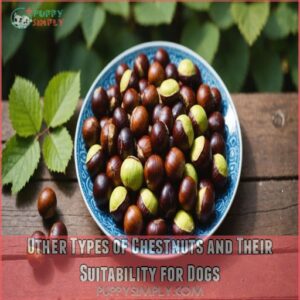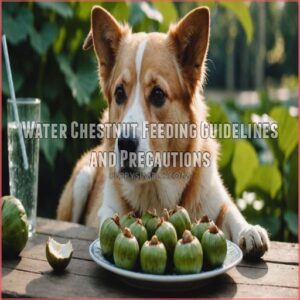This site is supported by our readers. We may earn a commission, at no cost to you, if you purchase through links.
 Can dogs eat water chestnuts? Yes, but with caution!
Can dogs eat water chestnuts? Yes, but with caution!
You can give your pup a small amount of peeled, raw water chestnuts as a treat.
Just remember to chop them into bite-sized pieces to avoid choking. Think of it like giving them a crunchy, watery snack.
Avoid canned water chestnuts; they’re often loaded with salt, which isn’t good for your furry friend. Too many could upset their tummy.
Want to know more about the nutritional benefits and potential risks? We’ll explore those next!
Table Of Contents
- Key Takeaways
- What Are Water Chestnuts?
- Are Water Chestnuts Healthy for Dogs?
- How to Prepare Water Chestnuts for Dogs
- Risks of Giving Water Chestnuts to Dogs
- Can Dogs Eat Canned Water Chestnuts?
- Can Dogs Eat Raw Water Chestnuts?
- Other Types of Chestnuts and Their Suitability for Dogs
- Water Chestnut Feeding Guidelines and Precautions
- Frequently Asked Questions (FAQs)
- What if my dog eats chestnuts?
- Can dogs have sugar snap peas and water chestnuts?
- Are canned water chestnuts safe?
- What animal eats water chestnut?
- How many water chestnuts can dogs eat daily?
- Are there any breeds that shouldnt eat them?
- Can puppies safely eat water chestnuts?
- What are signs of allergic reactions in dogs?
- Are there benefits for senior dogs eating them?
- Conclusion
Key Takeaways
- You can safely give your dog raw, peeled, and chopped water chestnuts as a crunchy treat, but cut them into small pieces to prevent choking.
- Avoid canned water chestnuts due to their high sodium content, which can lead to sodium toxicity in dogs.
- Water chestnuts offer low-calorie hydration and essential vitamins like B vitamins and potassium but should be fed in moderation to prevent digestive upset.
- Always watch your dog for allergic reactions or digestive issues when introducing new treats, and consult your vet to ensure safety.
What Are Water Chestnuts?
Water chestnuts, originally from Asia, are tuber vegetables that thrive in watery areas. They’re not actually nuts and can be enjoyed raw or cooked, often appearing in stir-fries.
Origin and Nutrition
Water chestnuts, hailing from the watery terrains of Asia, aren’t actually nuts but tuber vegetables.
These crunchy delights play a key role in Asian cuisine, adding a nutritional punch with their rich content of vitamins and minerals.
They’re packed with dietary fiber, contributing to health benefits.
Despite their crunchy texture, water chestnuts make healthy snacks for dogs in moderation.
Preparation and Consumption
Don’t be fooled by the name—water chestnuts aren’t nuts.
They’re crunchy veggies that thrive in wet areas and make great dog snacks.
For safe preparation, peel off the tough skin and chop them into small pieces to avoid choking hazards.
This simple prep transforms them into dog-safe treats, adding a splash of fun to your canine nutrition plan.
Are Water Chestnuts Healthy for Dogs?
Water chestnuts can be a healthy treat for dogs in moderation, as they’re rich in essential vitamins and minerals like vitamin B, potassium, and manganese.
Water chestnuts are hydrating due to their low-calorie nature and high water content.
However, the tough skin and high fiber levels require careful preparation to avoid digestive issues.
Nutritional Benefits
You’re considering adding water chestnuts to your dog’s diet, but are they healthy?
They offer some benefits as a low-calorie snack and provide hydration with their high water content.
Offering variations in treats keeps your dog interested, and water chestnuts can be a good choice.
Just remember, it’s always wise to keep treat frequency in check and follow vet recommendations.
Vitamins and Minerals
Thinking about adding water chestnuts to your dog’s diet? They offer some nutritional perks!
Water chestnuts boast a decent amount of vitamins and minerals important for your furry friend’s well-being.
Here’s what you should know about their mineral content:
- Vitamin B: Supports a healthy metabolism.
- Potassium: Aids in heart health.
- Manganese: Essential for bone health.
- Copper: Plays a role in energy production.
Always check with your vet before introducing new foods.
Low-Calorie and High-Fiber Content
Following the vitamins and minerals that keep your pup energized, consider the calorie punch.
If you’re looking for healthy dog treats, check out dog water chestnut products.
Water chestnuts offer low-calorie, high-fiber benefits, perfect for balancing fiber digestion and calorie control.
A treat that supports weight management sounds perfect, right?
Just make sure these munchies fit your dog’s food plan.
Can dogs eat water chestnuts? Absolutely, but moderation is key in any canine diet.
How to Prepare Water Chestnuts for Dogs
When preparing water chestnuts for your dog, start by peeling them to remove the tough outer layer, which can pose a choking hazard.
Then, chop them into small, bite-sized pieces, ensuring they’re plain without any toxic seasonings like onions or garlic.
Peeling and Chopping
Water chestnuts can be a healthy treat for dogs if prepared correctly.
First, peel them using safe peeling tools to avoid any choking hazards.
Next, focus on chopping techniques.
Make sure pieces are small enough for your dog’s size.
Watch out for toxic foods, and remember these steps:
- Peel thoroughly
- Chop cautiously
- Use safe tools
- Size appropriately
Cooking Methods
After peeling and chopping, selecting the right cooking method adds a layer of safety and taste.
Boiling, steaming, or microwaving water chestnuts keeps them healthy for your furry friend.
Frying with minimal oil or roasting can also work.
For small pups, these methods offer a digestible texture while keeping their canine health in check.
Always adjust according to your dog nutrition guide.
Avoiding Toxic Additives
You’ve probably heard about onion-garlic dangers for dogs.
When preparing water chestnuts, steer clear of these and other additives like high-sodium content found in human snacks like Cheez-Its.
Stick with plain, sliced water chestnuts as safe snack alternatives.
To avoid excessive sodium and toxic ingredients like onion powder in dog treats, consider alternatives to commercial snacks, such as sodium-free alternatives. Prioritize homemade treats over commercial dog treats to manage sodium toxicity risk.
Always consider your dog’s nutritional needs and dietary restrictions, ensuring their snacks are both safe and enjoyable.
Risks of Giving Water Chestnuts to Dogs
Feeding your dog water chestnuts might seem harmless, but there are risks like choking hazards and gastrointestinal upset to keep in mind.
Canned water chestnuts can lead to sodium toxicity, which is dangerous for your pet’s health.
Choking Hazards
Giving your dog whole water chestnuts is risky business; those tough skins present significant dog choking dangers.
Always prioritize choking prevention.
Here’s what you need to know:
- Cut water chestnuts into tiny pieces.
- Supervise your dog while they eat.
- Learn dog choking signs.
- Choose safe treats, avoiding horse chestnuts altogether.
Remember, prevention is key!
Gastrointestinal Upset
While choking hazards are a concern, don’t overlook that water chestnuts’ high fiber content can lead to digestive issues in dogs.
If you’re looking for more information on can dogs eat chestnuts, some products are specifically designed with canine safety in mind for safe chestnuts.
Too much fiber might cause stomach upset or even food allergies.
Always integrate water chestnuts into dog food gradually to monitor their response.
| Concern | Risk Factor | Action |
|---|---|---|
| Choking | Whole pieces | Cut into small |
| Digestive issues | High fiber | Moderate intake |
| Food allergies | Sensitivity | Observe reaction |
Sodium Toxicity in Canned Water Chestnuts
Although canned water chestnuts seem like a fun treat for your dog, their high sodium levels spell trouble.
Sodium toxicity is a serious risk, causing issues like:
- Depression – making your pup lethargic
- Seizures – alarming, right?
- Ataxia – or wobbly walking
- Weakness – a big no-no
Stick with fresh water chestnuts instead!
Can Dogs Eat Canned Water Chestnuts?
You might think sharing your canned water chestnuts with your dog is a good idea, but it’s best to avoid it.
Canned varieties are loaded with sodium, which can lead to serious health problems like sodium toxicity in dogs.
High Sodium Content
Canned water chestnuts might seem convenient, but think twice before sharing them with your furry friend.
The high sodium content in canned foods poses a risk, as dogs don’t need extra salt in their diet.
When choosing a balanced nutrient profile for your pup, look for options that are life stage-appropriate formulations.
Instead, explore sodium-free options or homemade treats.
Keep your pup’s health in mind, and always opt for lower-salt content choices to guarantee safety.
Adverse Effects of Sodium Toxicity
You’ve got to watch out for sodium toxicity regarding your dog and canned water chestnuts.
Symptoms might sneak up on you:
- Tremors: Not the fun kind; these are warning signs.
- Seizures: A scary outcome of high sodium levels.
- Weakness: Your furry friend may struggle to move.
- Collapse: The worst-case scenario and a sure sign of trouble.
Can Dogs Eat Raw Water Chestnuts?
Sure, canned water chestnuts are a no-go, but what about raw ones?
Raw water chestnuts can be a crunchy treat for your dog if you’re mindful of a few things, similar to how American chestnuts are safe for dogs.
They offer low-calorie hydration, and the fiber can aid in digestion.
However, make sure to peel them first to avoid any water chestnut skin hazards.
Some dogs might experience a water chestnut allergy or digestive issues, so introduce them slowly and observe any reactions.
For a tasty snack, slice them into bite-sized pieces.
Keep an eye on your furry friend to make sure they’re enjoying the treat safely.
If you notice any discomfort, it’s best to stop.
Mixing a few of these tasty slices in their treats recipe might just keep things fresh and exciting.
Other Types of Chestnuts and Their Suitability for Dogs
Not all chestnuts are created equal in regard to your canine companion.
While some, like American chestnuts, offer nutritional benefits, others, such as horse chestnuts, are highly toxic and pose a serious risk to your dog’s health.
Always carefully identify any chestnut before allowing your dog near it.
American Chestnuts
While you might think American chestnuts are just for pies, they actually offer surprising benefits for dogs.
These nuts, soaked in history and prized for their farming potential, are nutritious with omega fatty acids.
When introducing new nuts like American chestnuts into your dog’s diet, consider consulting a list of safe dog snacks to make sure their health is protected.
Unlike water chestnuts, American chestnuts can be fed to dogs.
Remember to:
- Check for freshness
- Avoid seasoning
- Introduce gradually
- Monitor for allergies
Horse Chestnuts and Their Toxicity
Horse chestnuts are a real no-go for dogs, packed with toxins like aesculin and saponins that can mess with their brain and nervous system.
American chestnuts, on the other hand, are a nutritious and safe alternative, serving as a good source of vitamin C and B vitamins.
Identifying these toxic nuts is very important for keeping your furry friend safe.
If your pup gets curious, first aid is essential while seeking a vet for potential horse chestnut poisoning treatment.
Stick to safe alternatives!
Symptoms of Horse Chestnut Ingestion
Imagine this: your dog’s gotten into horse chestnuts, known for their toxic effects.
You might notice alarming symptoms, which call for emergency care.
Keep your eyes peeled for these signs:
- Vomiting and diarrhea: These are immediate red flags.
- Neurological issues: Ataxia or stumbling can occur.
- Seizures or coma: Require immediate vet advice to keep your dog safe.
Water Chestnut Feeding Guidelines and Precautions
To make sure your dog’s safety when feeding water chestnuts, it’s important to introduce them slowly and watch for any adverse reactions.
Always consult a veterinarian before adding new foods to your dog’s diet to make sure it’s a suitable choice for their health.
Monitoring a Dog’s Response
Feeding your dog water chestnuts? Keep an eagle eye on their reactions.
Look out for allergic signs or digestive upset, like noticeable behavioral changes.
If your furry buddy seems fine, it’s a green light to offer this treat occasionally.
Remember, sticking to a safe treat frequency makes sure they enjoy the benefits without any tummy troubles sneaking up.
Consulting a Veterinarian
Although your dog might wag its tail at the idea of trying something new, check with your vet before adding water chestnuts to its diet.
This makes sure you address dog allergies or specific needs while exploring safe treats.
Vets can offer advice on water chestnut alternatives and give vet approval, keeping tails wagging and your peace of mind intact.
Frequently Asked Questions (FAQs)
What if my dog eats chestnuts?
If your dog eats chestnuts, check which type—American chestnuts are fine, but horse chestnuts are toxic.
Look for symptoms like vomiting or seizures.
If concerned, call your vet right away to make sure your pup’s safety.
Can dogs have sugar snap peas and water chestnuts?
Over 90% of snap peas are water, making them a hydrating treat for dogs.
Dogs can munch on sugar snap peas and water chestnuts in moderation.
Just peel and chop water chestnuts to prevent choking hazards.
Are canned water chestnuts safe?
Canned water chestnuts aren’t ideal for dogs due to their high sodium levels, which can lead to health issues.
Stick to fresh ones, after peeling and chopping, to keep things on the safe side for your furry friend.
What animal eats water chestnut?
Water chestnuts draw interest from several animals like waterfowl and beavers, who chow down on these crunchy plants found in their watery homes.
You might say they’re nature’s snack bar for critters paddling around wetlands.
How many water chestnuts can dogs eat daily?
Feed your dog a small amount, like one to two chopped water chestnuts daily, ensuring they’re peeled and plain.
Always introduce them gradually.
Keep an eye out for digestive issues, and consult your vet for guidance.
Are there any breeds that shouldnt eat them?
No specific breeds should avoid water chestnuts, but always supervise your dog and start with tiny amounts.
Watch for any tummy troubles.
If you see problems, stop giving them and chat with your vet.
Can puppies safely eat water chestnuts?
Puppies, with their tiny tummies and boundless curiosity, can nibble on water chestnuts safely if they’re peeled and cut into pieces.
Start slow to prevent any tummy trouble, and always consult your vet before introducing new treats.
What are signs of allergic reactions in dogs?
Watch for itching, redness, swelling, and sneezing as signs of allergic reactions in dogs.
Dogs might also have runny noses, chronic ear infections, or digestive issues like diarrhea.
Always consult your vet if symptoms appear suddenly.
Are there benefits for senior dogs eating them?
Just as senior dogs slow down, water chestnuts bring a boost.
They’re low-calorie, hydrating treats packed with vitamins B, potassium, and fiber.
Always introduce them gradually and without the canned sodium spike, ensuring safe enjoyment.
Conclusion
Though water chestnuts seem like a crunchy treat for dogs, exercise caution.
While they’re low-calorie and fiber-rich, they carry choking risks and can upset the stomach.
As always, avoid canned varieties due to high sodium, which can harm your pet.
When introducing water chestnuts, observe your dog’s response and consult your vet if needed.
With these points in mind, you can decide if your furry friend should enjoy these unique treats.
















